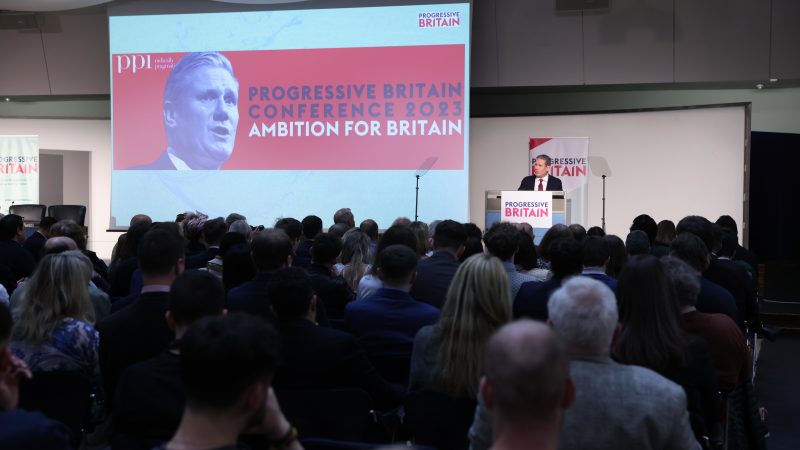
“Clause IV on steroids” got the headlines, of course. But the most fascinating parts of Keir Starmer’s speech last week to the Progressive Britain conference lay a little deeper below the surface. At a time when Sir Keir is frequently chastised for lacking ideas, it was probably his most philosophical speech to date. As such, it revealed some of the thinkers and ideas the Labour leader is drawing on today.
The speech was structured around three principles – service, respect, stability – with the latter two taking up most of the time. In majoring on respect, Starmer revisited a theme first aired in his 2022 new year’s speech. As then, he combined this interest with personal backstory: “This is everything to me – I saw how feelings of disrespect weighed my father down and chipped away at his esteem.”
A focus on respect has potential political and policy benefits
As I have previously written for Demos, the concept of respect has deep philosophical roots in the work of Elizabeth Anderson, a philosopher based at the University of Michigan in the US. Anderson has pioneered the idea of relational egalitarianism. Traditionally, egalitarians are concerned with resources – who has what – or rights – who is granted what. Relational egalitarianism is instead concerned with how people relate to one another.
Relational inequality exists when there is a ‘respect gap’; one group or individuals look down on others, failing to treat them with the respect they deserve. So in Starmer’s case, his father’s employment as a toolmaker (something he has spoken about on many occasions) meant he felt looked down upon by others.
I remain convinced of the potential political and policy benefits of the nascent ‘respect agenda’. This is largely because I feel it better captures what has gone wrong in this country than material analyses alone. People aren’t just poorer than they’d like to be (though, of course, they are); they also feel disrespected by others.
As James Plunkett has argued, the main currency of inequality today “isn’t money or material resources; it’s status, agency, and pride”. Indeed, such feelings have driven much of Britain’s politics and policy post-Brexit, with the ‘levelling up’ agenda explicitly seeking to help ‘left behind’ places; a relational concept as much as a material one.
These are sentiments that populist politicians on the right across the world have effectively weaponised in the post-crash era. Encouragingly, though, progressive politicians are increasingly seeking to reclaim this agenda. That’s just what the Social Democratic Party in Germany has done, with Olaf Scholz’s respect agenda powering him to victory in last year’s elections. In seminars and talks, an interesting exchange of ideas has been happening between Germany and the UK’s centre left; it’s no surprise to see that thinking crop up in Starmer’s speech.
How can Labour translate the ‘respect agenda’ into policy?
One concern I’ve always had about the respect agenda is the difficulty of translating it into policy. One answer Starmer offered in his speech was a move away from redistribution: “That does gnaw away at your confidence in the future, that if you see an economy which hoards power and potential – where the South East creates the wealth and the only answer that’s offered is redistribution – that doesn’t treat our communities with the dignity or respect that they deserve.”
As is often the case in politics, though, it’s easier to point out problems (redistribution is bad) than offer a solution (what do we replace it with?). This, I think, was part of the challenge when Ed Miliband raised similar ideas under the short-lived ‘predistribution’ agenda: how to deliver it?
The answer, according to the Labour leader, lies in good jobs, with Starmer describing the creation of “secure, well-paid jobs as the litmus test for our politics”. Here, we can again see the ideas of a US-based academic; this time, the economist Dani Rodrik.
Rodrik sees ‘good jobs’ as at the core of delivering positive change in western democracies: “”Good jobs”… pay sufficiently well to allow for a reasonable living standard with some security and savings, are relatively stable and with safe working conditions and offer some career progression… Conversely, a shortage of good jobs comes at social, political and economic costs. Social consequences can take the form of exclusion, broken families, drug abuse, addiction and crime. Political ills such as polarization, the rise of populism, backlashes against globalization and immigration, decline in trust in government, experts and institutions can follow.”
Prioritising good jobs could deliver an economic paradigm shift
Talking about good jobs might not sound radical. But Rodrik’s wider vision, if adopted by Labour, could deliver a genuine economic paradigm shift. Rodrik’s paper, On Productivism, published in March this year, makes the best attempt I have read to define the next economic paradigm after neoliberalism.
Rodrik calls this new paradigm productivism: “An approach that prioritizes the dissemination of productive economic opportunities throughout all regions of the economy and segments of the labor force.” Essentially, good jobs for all.
Yes, legitimate questions remain about how easy such policies are to pursue outside a US context. But embracing the new productivist paradigm would go some way to addressing the criticism that the Labour leader has no big ideas.
It would also mark a serious break from Tony Blair, who largely left the economy to its own devices and delivered social justice through redistribution. At a time when Starmer can seem to win no praise from the left, let alone traditionally favourable media, this should be welcomed.



More from LabourList
Humza Yousaf woes deepen as Labour files no-confidence vote in government
‘History and poll leads suggest Labour can be bolder, even if it costs some votes’
Labour warned ‘ethical foreign policy’ inevitably sparks charge of ‘hypocrisy’